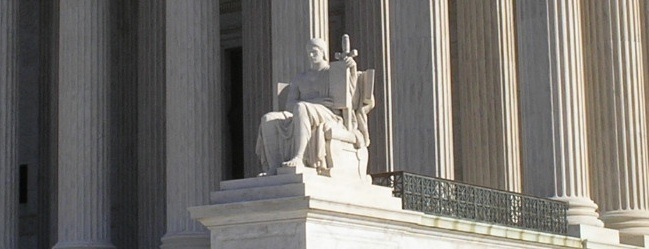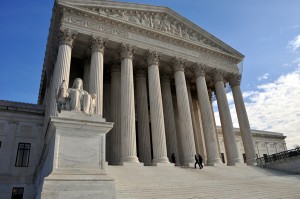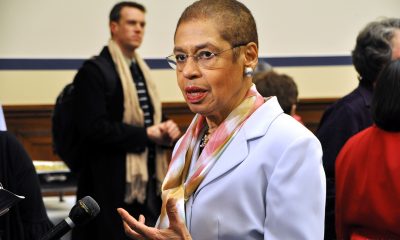Local
Supreme Court rejects D.C. marriage challenge
Action ends effort to force ballot measure

The U.S. Supreme Court issued an order today denying a request by a local minister to consider a case seeking to force the District of Columbia to allow voters to decide whether to repeal the city’s same-sex marriage law.
The order, which did not include any statement or opinion, ends the effort by Bishop Harry Jackson and other local opponents of same-sex marriage to go through the courts to impose a ballot measure calling for overturning the Religious Freedom and Civil Marriage Equality Amendment Act of 2009, which legalized same-sex marriage in the District.
None of the Supreme Court’s nine justices issued a dissent in their unanimous determination not to take the case.
“We are pleased that the Supreme Court turned down Bishop Jackson’s request for review of the Court of Appeals decision on marriage equality,” said Peter Rosenstein, president of the Campaign for All D.C. Families, the local group that campaigned for passage of the marriage equality law.
“This confirms our belief that what the D.C. Council did is both legal and just,” he said. “Equality will not be denied.”
Rosenstein was referring to a decision last October by the D.C. Court of Appeals that upheld an earlier ruling by the city’s Board of Elections and Ethics to reject a voter initiative proposed by Jackson and other same-sex marriage opponents calling for repealing the marriage equality law.
In the case known as Jackson v. the D.C. Board of Elections and Ethics, Jackson sought to force the city to hold a voter initiative that, if approved, would repeal the same-sex marriage law and replace it with a new law defining marriage in the District as a union only between a man and a woman.
The Court of Appeals decision stated that D.C. City Council acted within its authority under the city’s congressionally mandated Home Rule Charter when it imposed certain restrictions more than 30 years ago on the types of initiatives and referenda that could be placed on the ballot.
Among the restrictions adopted then was a ban on ballot measures that, if approved by voters, violate the non-discrimination provisions of the D.C. Human Rights Act. The act, among other things, bans discrimination based on sexual orientation.
Jackson and a team of lawyers representing him argued that Council violated the Home Rule Charter by adopting the ballot measure restrictions.
The Supreme Court today rejected Jackson’s request for a Petition for a Writ of Certiorari, which asked the court to hear the case to enable Jackson to appeal the ruling of the D.C. Court of Appeals. By denying that request, the Supreme Court allowed the Court of Appeals decision to permanently remain in effect.
“Today’s action by the Supreme Court makes abundantly clear that D.C.’s human rights protections are strong enough to withstand the hateful efforts by outside anti-LGBT groups to put people’s basic civil rights on the ballot,” said Joe Solmonese, president of Human Rights Campaign.
“For almost two years, the National Organization for Marriage and the Alliance Defense Fund, along with Bishop Harry Jackson, have fought a losing battle to shamelessly harm gay and lesbian couples in D.C. who seek nothing more than to share in the rights and responsibilities of marriage,” Solmonese said.
According to the Supreme Court’s public docket, the nine justices deliberated over whether to hear the Jackson case in a private conference held last Friday. Under longstanding court rules, the justices usually announce a decision on whether to accept or reject a case on the next business day following such a conference.
With the Supreme Court denying Jackson’s court challenge to the same-sex marriage law, marriage equality opponents are expected to take their fight back to Congress by resuming earlier requests for Congress to either overturn the D.C. marriage law or to impose a new law forcing the city hold a ballot measure to allow voters to decide the issue.
D.C. Council member Phil Mendelson (D-At-Large), who chairs the committee that shepherded the same-sex marriage law through the Council in 2009, said city voters have demonstrated through the city’s 2010 primary and general election that the marriage law was not a pressing issue for them.
He noted that despite promises by same-sex marriage opponents to work for the defeat of all Council members who voted for the marriage law, just a few candidates opposing the law surfaced in the elections and all of them lost by lopsided margins.
“They’ve lost in the courts, they lost overwhelmingly in the Council 12 to 1 [when the marriage bill came up for a vote in December 2009], and they lost at the ballot box,” he said. “Now they’ve lost their last chance, their last gasp in the judicial system.”
Jackson couldn’t be immediately reach for comment.
Rev. Anthony Evans, a D.C. minister who is working with Jackson to overturn the D.C. same-sex marriage law, called the Supreme Court’s refusal to hear the Jackson case “a travesty of justice.”
“This law was forced down the church’s throat and what the Supreme Court has set up is the greatest civil war between the church and the gay community,” Evans said. “And let me just state for the record, we don’t want that fight. We love our gay brothers and sisters. But if the Supreme Court is not going to acknowledge the fact that we have a right as religious people to have a say-so in the framework of religious ethics for our culture and society, then we reject the Supreme Court on this issue.”
Supporters of the same-sex marriage law have noted that large numbers of local religious leaders from all denominations, including black churches, came out in support of the law. Many have begun peforming same-sex marriages.
Evans, an official with the D.C.-based National Black Church Initiative, said local same-sex marriage opponents have began discussions with “our Republican friends” in Congress to take steps to challenge the D.C. marriage law. He declined to disclose further details but said he and others opposed to the marriage law lobbied GOP leaders on the Hill to strip congressional delegate Eleanor Holmes Norton (D-D.C.) of her voting privileges on the House floor.
Since Republicans took control of the House earlier this month, GOP leaders revoked Norton’s limited floor voting privileges that Democrats gave her when they took control of the House in 2007. House GOP leaders also revoked the limited voting privileges for delegates representing U.S. territories and Puerto Rico.
“[O]ur first action was to make sure that Eleanor didn’t get a vote as punishment for her wholehearted support for same-sex marriage in this city and also for her to ignore the black religious community,” Evans said. “There is a consequence to her actions. That was one of them.”
Norton, reached at her office late Wednesday, disputed Evans’ claim that same-sex marriage opponents played any role in her loss of House voting privileges.
Norton was referring to House Republican leaders’ decision to strip her of voting privileges when they gained control of the House in 1995. Democrats restored her voting privileges when they regained control of the House in 2007.
“But in any case, shame on any resident who wants the District of Columbia not to have a vote,” she said.
Norton said she expected some members of Congress to attempt to overturn the city’s same-sex marriage law through legislation, although she was hopeful that Democrats and moderate Republicans would join forces to defeat such legislation.
“I can tell you that I’ve had a good conversation with an important Republican who’s not interested,” she said, referring to efforts to overturn the D.C. marriage law. “That doesn’t mean that won’t happen. But there are Republicans here who would not like to get all mixed up with social issues.”
District of Columbia
Gay ANC member announces candidacy for Ward 1 D.C. Council seat
Community leader Brian Footer seeking seat held by Brianne Nadeau

Gay Advisory Neighborhood Commissioner Brian Footer, a community activist who has been involved for many years in local and national government affairs, has announced his candidacy for the Ward 1 D.C. Council seat up for election in 2026.
Footer, a Democrat, will be running in the city’s June 2, 2026, Democratic primary for the Ward 1 Council seat, but it is uncertain whether he will be running against incumbent Ward 1 Council member Brianne Nadeau (D). Nadeau has not yet announced if she plans to run for re-election for a fourth term following her 12 years on the Council.
Nadeau has been a longtime vocal supporter of the LGBTQ community.
If Footer were to win the primary and the November 2026 general election, he would become the Council’s second openly gay member. Ward 5 Council member Zachary Parker (D) is currently the 13-member Council’s only gay member.
Footer is a three-term ANC commissioner who currently serves as Chair of ANC 1E, which represents the city’s Adams Morgan neighborhood.
“Brian has worked at every level of government — federal, state, and local — building a career rooted in public service, aging policy, and inclusive urban planning,” a statement on his campaign website says.
“I’m running for Council because too many people in Ward 1 are doing everything right and still feel ignored by the city they call home,” Footer states on his website.
“I’m running because we can do better,” his statement continues. “That means making housing more affordable, addressing homelessness with real solutions, and keeping our neighborhoods safe with smart, community focused strategies.”
When contacted by the Washington Blade for comment, Nadeau said she was not ready at this time to discuss her plans about running again or about Footer’s candidacy.
“The primary is a ways away, and I’m very focused right now on the budget and the stadium deal and all the work that we’re doing at the Council,” she told the Blade. “So, I really haven’t had time to turn to my plans. So, as a result, I’m also not going to be commenting on anybody else who is determined that they’re running at this time.”
She first won election to the Council in 2014 after she defeated four-term gay Ward 1 Council member Jim Graham in the Democratic primary after Graham became embroiled in an ethics controversy.
In the 2022 Democratic primary Nadeau defeated gay challenger Salah Czapary in a three-candidate race, by a margin of 48.5% of the vote compared to Czapary’s 30.9%.
With the third candidate, Sabel Harris, receiving 20.4%, the outcome showed that the two challengers had a combined total vote count higher than Nadeau.
Further details of Footer’s candidacy can be accessed from his campaign website, brianfooterdc.com.
District of Columbia
Gay GOP group hosts Ernst, 3 House members — all of whom oppose Equality Act
Log Cabin, congressional guest speakers mum on June 25 event

U.S. Sen. Joni Ernst (R-Iowa) and three women Republican members of the U.S. House appeared as guest speakers at the June 25 meeting of Log Cabin Republicans of D.C., the local chapter of the national LGBTQ Republican group with that same name.
The U.S. House members who joined Ernst as guest speakers at the Log Cabin meeting were Celeste Maloy (R-Utah), Kat Cammack (R-Fla.), and Julia Letlow (R-La.).
Neither D.C. Log Cabin Republicans President Andrew Minik nor spokespersons for Ernst or the three congresswomen immediately responded to a request by the Washington Blade for comment on the GOP lawmakers’ appearance at an LGBTQ GOP group’s meeting.
“Please join us for an inspiring evening as we celebrate and recognize the bold leadership and accomplishments of Republican women in Congress,” a D.C Log Cabin announcement sent to its members states.
“This month’s meeting will highlight the efforts of the Republican Women’s Caucus and explore key issues such as the Protection of Women and Girls In Sports Act and the broader fight to preserve women’s spaces in society,” the message says.
It was referring to legislation pending in Congress calling for banning transgender women from participating in women’s sports events.
According to media reports, Ernst and the three congresswomen have expressed opposition to the Equality Act, the longstanding bill pending in Congress calling for prohibiting discrimination based on sexual orientation and gender identity in the areas of employment, housing, and public accommodations.
The Log Cabin announcement says the meeting was scheduled to take place at the Royal Sands Social Club, which is a restaurant and bar at 26 N St., S.E. in the city’s Navy Yard area.
D.C. Log Cabin member Stuart West, who attended the meeting, confirmed that Ernst and the three congresswomen showed up and spoke at the event.
“It was a good turnout,” he said. “I would definitely say probably 30 or 40 people attended.” West added, “Four women came to talk to a group of mostly gay men. That’s something you don’t see very often.”
District of Columbia
D.C. police seek public’s help in July 5 murder of trans woman
Relative disputes initial decision not to list case as hate crime

D.C. police are seeking help from the public in their investigation into the murder of a transgender woman who they say was shot to death at about 12:30 a.m. on Saturday, July 5, on the 2000 block of Benning Road, N.E.
But the police announcement of the fatal shooting and a police report obtained by the Washington Blade do not identify the victim, 28-year-old Daquane ‘Dream’ Johnson of Northeast D.C., as transgender. And the police report says the shooting is not currently listed as a suspected hate crime.
It was local transgender activists and one of Johnson’s family members, her aunt, who confirmed she was transgender and said information they obtained indicates the killing could have been a hate crime.
“On Saturday, July 5, at approximately 12:51 a.m., Sixth District officers were flagged down in the 2000 block of Benning Road, Northeast, for an unconscious female,” a July 5 D.C. police statement says. “Upon arrival, officers located an adult female victim suffering from gunshot wounds,” it says.
“D.C. Fire and EMS responded to the scene and transported the victim to a local hospital where after all lifesaving efforts failed and the victim was pronounced dead,” the statement says.
A separate police flyer with a photo of Johnson announces an award of $25,000 was being offered for information leading to the arrest and conviction of the person or persons responsible for the murder.
The flyer identifies D.C. police Homicide Detective Natasha Kennedy as being the lead investigator in the case and says anyone with information about the case should contact her at 202-380-6198.
Longtime D.C. transgender rights advocate Earline Budd told the Blade that one of the police investigators contacted her about the case and that she also spoke to Detective Kennedy. Budd said police confirmed to her that Johnson was a transgender woman.

One of Johnson’s family members, Vanna Terrell, who identified herself as Johnson’s aunt, told the Blade that Johnson used the first name of Dream and had planned to legally adopt that name instead of Daquane but had not gotten around to doing so.
Terrell said she and other family members learned more about the incident when one of two teenage high school students who knew Johnson’s brother contacted a friend and told the friend that they recognized Johnson as they witnessed the shooting. Terrell said the friend then called her to tell her what the friend learned from the two witnesses.
According to Terrell, the witnesses reportedly saw three men approach Johnson as Johnson walked along Benning Road and one of them called Johnson a derogatory name, leading Terrell to believe the men recognized Johnson as a transgender woman.
Terrell said one of the witnesses told the friend, who spoke to Terrell, that the man who shot Johnson kept shooting her until all of the bullets were fired. Budd, who said she spoke to Terrell, who also told her what the witnesses reported, said she believed the multiple shots fired by the shooter was an “overkill” that appears to have been a hate crime. Terrell said she too believes the murder was a hate crime.
In response to an inquiry from the Blade, Officer Ebony Major, a D.C. police spokesperson, stated in an email, “At this point there is nothing in the investigation that indicates the offense was motivated by hate or bias.”
Terrell said a memorial gathering to honor Johnson’s life was scheduled to be held Saturday, July 12, at River Terrace Park, which is located at 500 36th St., N.E. not far from where the shooting occurred.

-

 Federal Government2 days ago
Federal Government2 days agoTreasury Department has a gay secretary but LGBTQ staff are under siege
-

 Virginia3 days ago
Virginia3 days agoDefying trends, new LGBTQ center opens in rural Winchester, Va.
-

 District of Columbia2 days ago
District of Columbia2 days agoGay GOP group hosts Ernst, 3 House members — all of whom oppose Equality Act
-

 Opinions4 days ago
Opinions4 days agoUSAID’s demise: America’s global betrayal of trust with LGBTQ people













